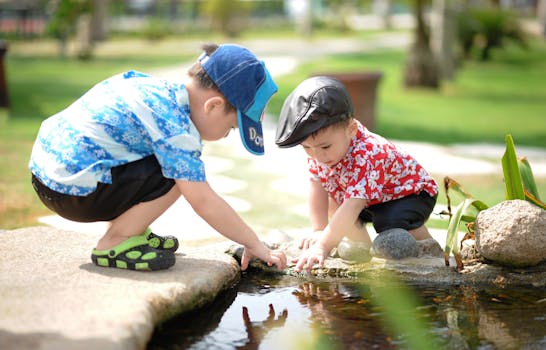what can you do to help your child make friends?

Friendship allows the child to learn a lot. Children who have friends have more varied and creative games, the research shows. They are also more open to new experiences. Later, at school, having friends would also help get good grades and protect against bullying.
Learning to make friends may be difficult for some toddlers, but it is an important step in early childhood. To achieve this, the child must learn to relate to others, to share, to imagine solutions to problems and to recognize his emotions as well as those of others. Thanks to several small gestures and to your help, your child will gradually be able to develop these social skills.
From 0 to 12 months
Praise your baby when he smiles at others. You can also show him to say hello and send a hand to say bye-bye.
Train your baby to be with other children. Even if he is too young to play with them, you can point him out when a child seems happy to see him.
Name his emotions. Even if your child does not speak, he already understands a lot. Say for example: "You are angry", "You have trouble" "You are happy! This will help him later to put words on what he feels.
Introduce your toddler in turn. If you build a block tower together, you can give it a block and say, "To you. When he gives you a block, say, "To me. He gradually gets used to waiting for his turn.
From 1 year to 3 years
Point out to your child the emotions of others. When you tell him a story, you can talk about the emotions that live the characters. If he is having fun with another child, you can also tell him how much the other seems happy to play with him.
When you teach your child to go to others, to share and to wait for his turn, you help him make friends.
Encourage your child to connect with others. Say, for example, "Look, a child is sliding. Do you want to go with him? "Accompany him if he hesitates.
Plan more toys for your trips to the park. Your child will be more open to sharing if you bring two shovels and two buckets.
Help your toddler put words on how he feels. If he's angry, you can tell him, "You're angry. Then explain to him that he has the right to be angry, but that he must say it with words instead of biting or beating.
Turn waiting for the play to help your child wait. If he wants to take the tricycle used by his sister, you can ask him to "put gasoline" in the "racing car" when it arrives next to him until it is his turn.
3 years to 5 years
Often give your child the opportunity to play with others. For example, invite a friend home and let the children invent their games.
Play the cards. Simple games like The Battle or Red or Black teach your child to wait his turn.
Help your child settle a chicane without doing it for him. Guide the children together to find a solution by saying, "Do you both want to play with the same toy? What could we do to make everyone happy? » Suggest solutions as needed, such as the role-play or the draw.
Use puppets. This game can help your child express his emotions through a character. For example, a puppet might be angry because someone else took his toy and you could let your child try to resolve the conflict.
He prefers to play alone
Some children have fun alone, it's in their personality. If your toddler seems happy with this situation and agrees to play with others occasionally, do not worry. On the other hand, if you feel that your child is unhappy, that he would like to play with others, but he can’t do it, you will have to help him to relate to others.


Commentaires
Enregistrer un commentaire